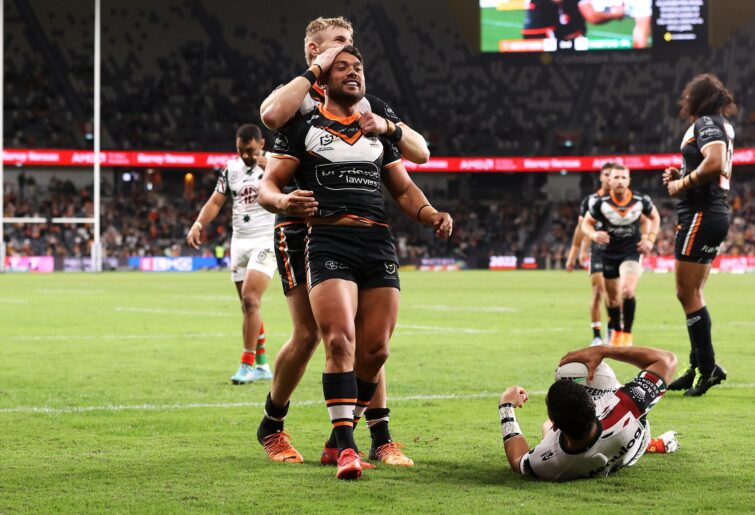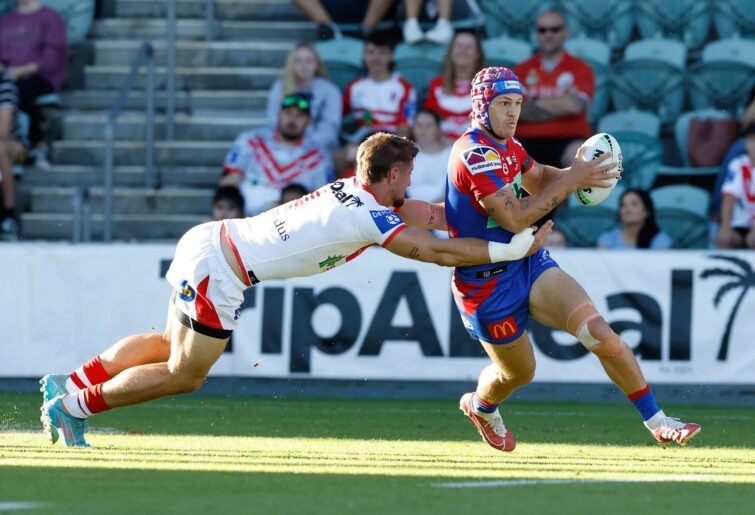
As Rampaging Roy Slaven and HG Nelson have noted, there’s been an alarming lack of discussion about rugby league during the federal election campaign.
Only two former rugby league players, Greg Dowling and Rod Jensen, are in the running for a seat in Parliament.
The leaders of the two major political parties are well known supporters of rugby league teams. While both have faced scrutiny about the details of their respective social and economic policy agendas, neither has been quizzed about their rugby league policies and credentials.
Does Cronulla’s most famous fan, Scott Morrison, know what the club’s average home crowd was during their inaugural season in 1967? Does Souths tragic Anthony Albanese know how many games Bronko Djura played for the Rabbitohs in the 1980s?
More broadly, what does Greens leader Adam Bandt know about his constituents, the Melbourne Storm? What is the position of One Nation leader and former federal member for Oxley in Brisbane’s western suburbs, Pauline Hanson, on the Brisbane Jets expansion bid?
Will Senator Hanson commit to introducing a Private Members Bill legislating the Jets into existence by 2025?
Our leaders may well have answers to these questions, but nobody’s asking, and they haven’t been compelled to outline their vision for how rugby league can address our biggest challenges.
Sadly, it’s fallen to visionaries like Roy, HG and me to outline a rugby league manifesto. I challenge our leaders to adopt this ambitious vision for the future of rugby league and our great nation.
The national rectangular stadium network
In recent weeks, the NRL and the New South Wales Government have been butting heads about the need for additional capital investment in Sydney’s smaller rugby league grounds.
Given the apparent impasse, federal leadership is needed to sort out the mess in Sydney and ensure citizens everywhere can enjoy rugby league in a rectangular stadium close to home.
Granted, our National Broadband Network is a dud, but our federal political leaders can redeem themselves by, for a start, adopting Roy and HG’s rough plan for a network of small-to-medium size rectangular stadiums across the length and breadth of Australia, all connected by very fast trains.

Then they can do even better. We need a plan that isn’t based on woolly notions of suburban tribalism or harebrained assumptions that people won’t come. Build them in the right place, get the transport links right and they will come.
We need minimum, measurable standards. Every Australian living on the mainland and in Tasmania should, at a minimum, live within a 10-kilometre radius of a 25,000-seat rectangular stadium.
Wouldn’t this mean building new stadia at Blackwater and Barcaldine, among many other places, I hear you ask? Yes, yes it would. This is where the NRL’s program of taking more games to regional areas meets the Federal Government’s objective of economic transition for regional mining communities in beautiful synergy.
Magic round at Moranbah. Bring it on!
Preliminary estimates indicate a total cost of at least $10 trillion. That’s only about 17 years’ worth of federal tax revenue. It’s called nation building – it would be a bargain at twice the price.
Rugby league and geopolitics in the Pacific
The election campaign currently underway has involved dark warnings about the declining influence of Australia and its allies in the broader Pacific region, and the rise of a geopolitical rival.
Keen observers know that Chinese investment and influence are already prevalent in bastions of rugby league like Tonga, Samoa and Fiji, as well as the most fanatical league nation of all, Papua New Guinea.
Naturally, the rugby league nations of the Pacific don’t see eye-to-eye on everything, but surely rugby league can be a uniting force.
The next Federal Government should establish a ministerial portfolio specifically responsible for rugby league and international cooperation. The new minister would be charged with convening a summit of political and rugby league leaders to develop a Pan-Pacific Treaty on Security and Rugby League.
The treaty would set out the shared values of each nation and prescribe a program of international fixtures over the following ten years. Any administrator who reneged on their international commitments, including Peter V’landys, would be subject to criminal proceedings at the International Court of Justice in the Hague.
Focus the nations of the Pacific on what really matters, get them playing rugby league and give them something to defend. The rest will take care of itself.
The cost of living and rugby league players
Many Australians are rightly concerned about the rising cost of essential goods and services. But there’s another inflationary problem in our midst: the cost of rugby league players.
Like the cost of living, its effects are not distributed evenly. A single Kalyn Ponga costs Newcastle more than $1 million per annum, while Melbourne pays a superior player, Ryan Papenhuyzen, somewhere in the vicinity of $700,000. David Fifita costs the Gold Coast $1.1 million per annum, while Cameron Murray costs Souths about $850,000.
Many hard-working Australians have copped a double whammy, being forced to pay through the nose for petrol and groceries while watching the inertia of David Fifita and Kalyn Ponga.

The solution is surprisingly simple. The premises of every NRL club should be excised from Australia’s general income tax zone, with a new special income tax area established for rugby league clubs.
Special income tax areas generally involve rebates for people who spend half their lives living and working at, for example, a research station in the Antarctic.
The special rugby league income tax area would involve variable rates linked to the proportion of a team’s salary cap taken up by every player and the world-renowned POPE player rating system.
Where a players’ POPE rating compared to his teammates is disproportionate to his share of the team’s salary cap in a financial year, he would be either credited or debited by the Australian Taxation Office.
In other words, go above and beyond and get a tax credit; hang around out wide chatting to the touch judge and incur a liability.
The slackers of the rugby league world would be incentivised to pull their fingers out. Players like James Tedesco, Payne Haas and Cameron Munster, who’d be doing well anyway, would be incentivised to take a fresh look at the benefits of playing for the Wests Tigers or Gold Coast Titans for the same salary.
Rugby league and an Australian republic
Shaking off the yoke of British Monarchy is unlikely to happen in the next term of Parliament, but the issue isn’t going away. Our leaders should be thinking about the future, and rugby league has a key role to play.
My main concern with the republican movement is the Constitutional void that will left behind when the vice-regal authority of the Mountbatten-Windsors departs Australian shores.
If it’s not carefully managed, the void could be filled by anybody. Can you imagine the chaos that would be unleashed by President John Eales or President Lance Franklin? The nation needs a firm constitutional hand that can command the respect of citizens and the fear of politicians.
The Federal Government should commit to holding a referendum in the next term of Parliament about embedding rugby league in the national Constitution. When the time for a new head of state comes, a former rugby league player would slide into the space vacated by the Royals.
There are a couple of forms this could take. Electors could choose a President from a selection of commanding former rugby league players with experience of at least 150 first grade games. Our elected representatives might behave themselves a bit better under the watchful eye of President Gorden Tallis or President Mark Geyer.
We could also stay close to tradition and appoint a great rugby league family as hereditary heads of state. I’d he happy to have the fearsome Sims clan and their heirs assenting to the laws of the land. Likewise, the Trbojevic clan. While they’re Manly-centric, they have much broader popular appeal and would surely enjoy the consent of citizens.
So Roarers, take to social media, ring your local member, put a sign on your front lawn and advance the rugby league manifesto.
The future of our nation depends on it.